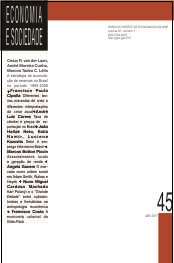Resumo
Este trabalho buscou identificar e dar visibilidade às múltiplas dimensões da pobreza, incluindo aí seus aspectos espaciais e as particularidades das desigualdades de gênero em Porto Alegre. Ele está baseado em resultados de pesquisa, na qual foram entrevistadas 16.386 pessoas vivendo em situação de pobreza nas diferentes regiões da cidade. A pesquisa buscou uma mudança de foco na análise sobre pobreza ao enfatizar o peso das dimensões que as pessoas consideram relevante para uma vida “digna de ser vivida”. Os resultados evidenciaram a importância de dimensões como habitação, saúde e educação para viabilizar às pessoas uma vida “digna de ser vivida”. Igualmente, mostraram as diferenças nas privações entre homens e mulheres, a heterogeneidade entre as regiões de Porto Alegre e, em especial, as formas como homens e mulheres vivenciam e manifestam suas percepções acerca da pobreza e das privações.
Abstract
bstractThis paper aims to discuss the importance of multidimensionality in understanding poverty in Porto Alegre, as well as to identify the spatial and gender disparities among its regions. The paper was based on a dataset from a survey conducted in 2007, in a two-stage methodology in which 16386 people living in poverty were interviewed. The results enabled the researchers to highlight the importance of dimensions such as habitation, health and education to allow people to “live a “dignified life”. It also shows the differences in deprivations between men and women, the heterogeneity among the Porto Alegre regions and, in particular, the way in which men and women shape their perceptions of poverty and deprivation.
Keywords: Poverty. Gender. Inequality. Capability
Referências
ARAÚJO, Clara; SCALON, Celi (Org.). Gênero, família e trabalho no Brasil. Rio de Janeiro: Editora da FGV, 2005.
CARREIRA, Denise (Coord.). Igualdade de gênero no mundo do trabalho: projetos brasileiros que fazem a diferença. São Paulo: Cortez; Brasília: Fundo de Gênero BrasilCanadá (FIG), 2004.
Chiappero Martinetti, E. A Multidimensional assessment of well-being based on Sen’s functioning approach. Rivista Internazionale di Scienze Sociallu, v. 108, p. 207-239, 2000.
Comim, F. Bagolin, I. Aspectos qualitativos da pobreza no Rio Grande do Sul. Ensaios FEE, Porto Alegre, v. 23, Número Especial, 2002.
Comim, F. Operatiozalizing Sen’s capability approach. Paper presented at Conference Justice and Poverty: examining Sen’s Capability Approach, Cambridge, 5-7 Jun. 2001.
DEATON, Angus. The analysis of household surveys: a microeconomic approach to development policy. World Bank Publications, 1997.
FOSTER, James; SEN, Amartya. On economic inequality after a quarter century. In: SEN, Amartya. On economic inequality: with a substantial annex after a quarter century by J. Foster & A. Sen. Oxford University Press, 1997.
GONÇALVES, Andréa Lisly. História e gênero. Belo Horizonte: Autêntica, 2006.
NARAYAN, D. Voices of the poor - Can anyone hear us? Washington, D.C.: The World Bank, Oxford University Press, 2000.Nussbaum, M. Sex and social justice. Cambridge: CUP, 1999.
NARAYAN, D. Woman and human development. Cambridge: CUP, 2000.
OBSERVATÓRIO DA CIDADANIA. Observatório da cidadania 2005: rugidos e sussurros. Montevidéu: ITe M – Instituto del Tercer Mundo; Rio de Janeiro: IBASE, 2005.
OLINTO, Gilda; OLIVEIRA, Zuleica Lopes Cavalcanti. Gênero e trabalho precário no Brasil urbano: perspectivas de mudança. In: Encontro Nacional de Estudos Populacionais (ABEP), 14, Caxambu (MG), set. 2004. Anais...
Pressman, S.; Summerfield, G. The economic contributions of Amartya Sen. Review of Political Economy. v. 12. n. 1, 2000. Qizilbash, M. A note on the measurement of poverty and vulnerability in the South Africa context. Journal of International Development, v. 14, p. 757-772, 2002.
ROBEYNS, Ingrid. The capability approach: a theoretical survey. Journal of Human Development, v. 6, n. 1, 2005.
ROBEYNS, Ingrid. The capability approach: an interdisciplinary introduction, teaching material for the training course preceding the 3rd International Conference on the capability approach, Pavia, Sept. 2003.
SCOTT, Parry; CORDEIRO, Rosineide. (Org.). Agricultura familiar e gênero: práticas, movimentos e políticas públicas. Recife: Ed. Universitária UFPE, 2006.
SEn, A. k. Capability and well-being. In: SEN, A.; NUSSBAUN, M. (Ed.). The quality of life. Oxford: Clarendon Press, 1993.
SEn, A. k. Commodities and capabilities. Amsterdam: North Holland, 1985.
SEn, A. k. Desenvolvimento como liberdade. São Paulo: Companhia das Letras, 2000.
SEn, A. k. Development as Freedom. Oxford, New York, 1999.
SEn, A. k. Development: which way now? The Economic Journal, v. 93, p. 745-762, 1983b.
SEn, A. k. Equality of what? In: McMURRIN, S. (Ed.). Tanner lectures on human values. Cambridge: Cambridge University Press, 1980.
SEn, A. k. Inequality re-examined. Oxford: Clarendon Press, 1992.
SEn, A. k. Poverty and famines: an essay on entitlement and deprivation. Oxford: Oxford University Press, 1982.
SEn, A. k. Resources, values and development. Oxford: Basil Blackwell, 1984b.
SEn, A. k. The living standard. Oxford Economic Paper, 36, 1984.
SEn, A. k. The standard of living. Cambridge: Cambridge University Press, 1987.
SOCIAL WATCH . Social Watch Report 2007: in dignity and rigths. Montevideo: Instituto del Tercer Mundo, 2007.
SMITH, A. Wealth of nations. Campbell and Skninner Edition, v. I, book 2, 1976.
STREY, Marlene N.; CABEDA, Sonia T. Lisboa; PREHN, Denise R. (Org.). Gênero e cultura: questões contemporâneas. Porto Alegre: EDIPUCRS, 2004.
A Economia e Sociedade utiliza a licença do Creative Commons (CC), preservando assim, a integridade dos artigos em ambiente de acesso aberto.


